Editorial
Moving forward safely
The government must consider ethical guidelines and protocols before granting approval for Covid-19 vaccine trials.
As Covid-19 vaccine trials start in several countries, Nepal has also decided to allow foreign companies to conduct Phase III clinical trials. The Ministry of Health and Population has directed the Nepal Health Research Council to grant permission to the companies that fulfil mandatory procedures for the trial. This has paved the way for Hongshi Shivam Cement which has sought permission to inoculate its 1,000 employees as part of the Phase III clinical trials of a Chinese vaccine.
The latest move by the ministry, which is at the helm of managing the Covid-19 situation in the country, has been welcomed by public health experts. But clinical trials should only be allowed if the results of Phase I and II have shown that the vaccines are safe and do not have adverse side effects, they have stressed.
Under Phase I, scientists test the vaccine on animals like monkeys and mice to study their immune response; and under Phase II, the vaccine is administered to a sizeable number of people—numbering in the hundreds—who are split into different age groups to study if the vaccine acts differently in them and also to confirm the vaccine’s safety and its ability to stimulate the system.
Under Phase III clinical trials, scientists inoculate a large number of the population—in the thousands—or with placebo in order to study how many people get infected.
Before a vaccine is declared effective, at least 50 percent of those who volunteered for the trial must be protected against the virus. Several countries are currently undergoing Phase III clinical trials as the world races to develop and produce the vaccine since the coronavirus continues to spread across the world and kill people.
Vaccines, which generally take years of research and testing before they are introduced to the public, are currently moving ahead at a record pace because of investments in the billions. There are currently 165 vaccines being developed, 32 of which are under human trials; and at the forefront of this race are China, Russia and Oxford University in the United Kingdom, which have also shown interest to conduct Phase III trials in Nepal.
Nepal must move forward safely as vaccine manufacturers show their interest to execute clinical trials in the country. But the government should not ignore ethical guidelines and national research protocols before granting approval to the respective companies and must impart transparent information about the proposed trials to the public.
Considering how misinformation surrounding Covid-19 continues to stigmatise certain communities, the government needs to engage with the public and the communities where the vaccine trials will be carried out. It must make public all studies of Phase I and II trials and ensure that there is informed consent from the volunteers who would want to participate in the human trials. Given the Nepali society’s complex structure, it is important that volunteers from multiple backgrounds have a sound understanding of what they will be signing up for so that they can make an independent decision.
While the race for the coronavirus vaccine has given us hope in these testing times, the public also needs to understand that the trials are imperative, given its effectiveness would be known only through trials. The government, meanwhile, should ensure through its diplomatic channels that the availability of the vaccines for the entire country is secured, once the results are successful and at an affordable price.




 14.24°C Kathmandu
14.24°C Kathmandu














